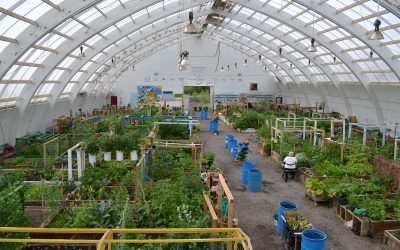Aruba is famous for year-round sunshine, award-winning beaches and for being “One Happy Island” that was even recently named the happiest island in the world. Beyond beach life, the island offers a dynamic culinary scene, luxury shopping and cultural festivals, and this diversity of experiences is attracting ever more visitors. In 2015, total arrivals increased by 14.3 percent to a total of 1.22 million stay-over visitors, with many visiting from the U.S. and Latin America.
As travel increases, the Government of Aruba and Aruba Tourism Authority strive to maintain a happy populace in addition to a profitable industry. To that end, the Government has recently introduced a new cap on all-inclusive resorts that will shape the future of tourism accommodations on the island.
Business Manager Dyane Vis-Escalona represented Aruba Tourism Authority (ATA) in discussions about the future of destination marketing at Destination Think Forum 2016. After the event, we asked Dyane and ATA CEO Ronella Tjin Asjoe-Croes why the cap is important, how the sharing economy will affect accommodations, and for their advice for destinations seeking a sustainable future for tourism.
Destination Think: Aruba recently announced a new cap on all-inclusive resorts to balance on-island accommodations. Why was it important to introduce this cap now?
Ronella Tjin Asjoe-Croes and Dyane Vis-Escalona, Aruba Tourism Authority: As the all-inclusive industry continues to evolve and respond to the growing demand for pre-packaged all-inclusive experiences, the impact for a destination can be detrimental. In most all-inclusive package tours, about 80% of travelers’ expenditures go to the airlines, hotels and other international companies (who often have their headquarters in the travelers’ home countries), and not to local businesses or workers. In addition, significant amounts of income actually retained at destination level can leave again through leakage.

Ronella Tjin Asjoe-Croes, CEO, Aruba Tourism Authority
This is important, because Aruba ranks number 2 in the world in terms of relative size of total travel and tourism contribution to GDP. The total contribution of Aruba’s Travel & Tourism industry represented 91% of Aruba’s GDP and 93% of Aruba’s total employment in 2015.
Considering Aruba’s high level of dependence on the tourism industry, it is imperative to formulate policy that best meets the island’s general interest. It is key to re-address policy regarding accommodation providers on island, considering the growing demand of accommodation providers and specifically the increased interest of the “all-inclusive” (AI) type of accommodations (to build and/or take over properties).
In this regard, the ATA, in close collaboration with the Government has conducted the necessary analyses and formulated actions that will foster a healthy and balanced portfolio of accommodations on island, and consequently a healthy contribution to Aruba’s GDP.
The all-inclusive type of accommodations and offerings (packages) dominating Aruba’s accommodations’ mix, goes against the island’s general interest.
Safeguarding the contribution of tourism to the island’s economy and to the wider scale of local and international suppliers of services and goods is very important, and this is why the Government of Aruba set a cap on the share of representation of all-inclusive hotel accommodations.
The adopted policy and regulation does not entail a complete elimination of full-fledged AI resorts. Aruba recognizes that the all-inclusive market is considered to be one of the fastest-growing segments of the leisure travel industry. In addition, there is an increase of the all-inclusive concept within the luxury vacation segment. It is key to remain competitive and to create and healthy and balanced mix of accommodations, while not alienating Aruba from the competitive set of those seeking all-inclusive hotels. It’s important to ensure that within the cap of all-inclusive hotels that the top products with higher yields are pursued.
How was this decision made and what was your DMO’s role in that process?

Dyane Vis-Escalona, Business Manager, Aruba Tourism Authority
The law was passed on August 23, 2016. The law is the result of a motion presented by the Aruba Parliament on May 7, 2015, instructing the Minister of Tourism to investigate the possibility of introducing a system of permits for AI hotels and accommodations as well as identifying the effects such permit structure may have on the Aruban economy.
As a Destination Marketing and Management Organization (DMMO), the Aruba Tourism Authority assisted the Government of Aruba with the necessary analyses and with the formulation of this new law.
How have your stakeholders such as hoteliers responded to this decision?
Like any decision of this magnitude, we received a mixture of responses. Some properties are naturally opposed to this cap. In addition to dialogues with the hotel sector, extensive dialogues took place with other stakeholders such as the Aruba Gastronomic Association, the Aruba Chamber of Commerce and the Aruba Trade and Industry Association.
In the recent ATA press release, Ronella mentioned discussions with Airbnb and that the sharing economy can “add value to the community and the visitor.” Can you briefly describe your approach to working with Airbnb and the value you seek from that relationship?
On November 7, the Aruba Tourism Authority and Airbnb signed an agreement that will position Aruba as a regional leader in the sharing economy and help to promote more tourism to the island. It will also create a framework to allow the Aruba Tourism Authority and Airbnb to address the issue of taxes, host accommodation standards and regulations and ensure that it is in line with Aruba’s tourism policy.
Currently, there are 1,360 Airbnb listings across the Island, welcoming a broad range of travelers to the country’s award-winning beaches, diverse culture and delectable culinary scene. This is part of A.T.A.’s strategy, which focuses on the diversification of the tourism industry and maintaining a good balance by keeping the happiness of its people at its core.
Do you have advice for other destinations that want to work toward diversifying their visitation or building more “sustainable, unique tourism products”?
Aruba believes sustainable, unique tourism stems from the dedication and happiness of the local people. As the exclusive Caribbean island to adopt the nation’s happiness index as a measure of success of its tourism development, Aruba encourages nations of all sizes to follow suit.
It’s important to measure the success of a country beyond economic indicators and to make happiness and well-being an integral part of our national dialogue and intent. Happy locals ensure our tourism experience remains positive for visitors, and it creates more opportunity for visitors to immerse themselves in Aruba’s authentic culture.
Destinations should also create a Destination Development Plan (DDP) to guide and provide specific recommendations for the policy and planning framework to ensure that the tourism industry grows in a manner that is responsible, economically, socially and environmentally sustainable, and that the development is able to meet the future needs of residents, visitors, investors and other stakeholders. The Aruba Tourism Authority is currently spearheading the development of its DDP with input from stakeholders and the community.
Featured image credit: Armand, Flickr









0 Comments